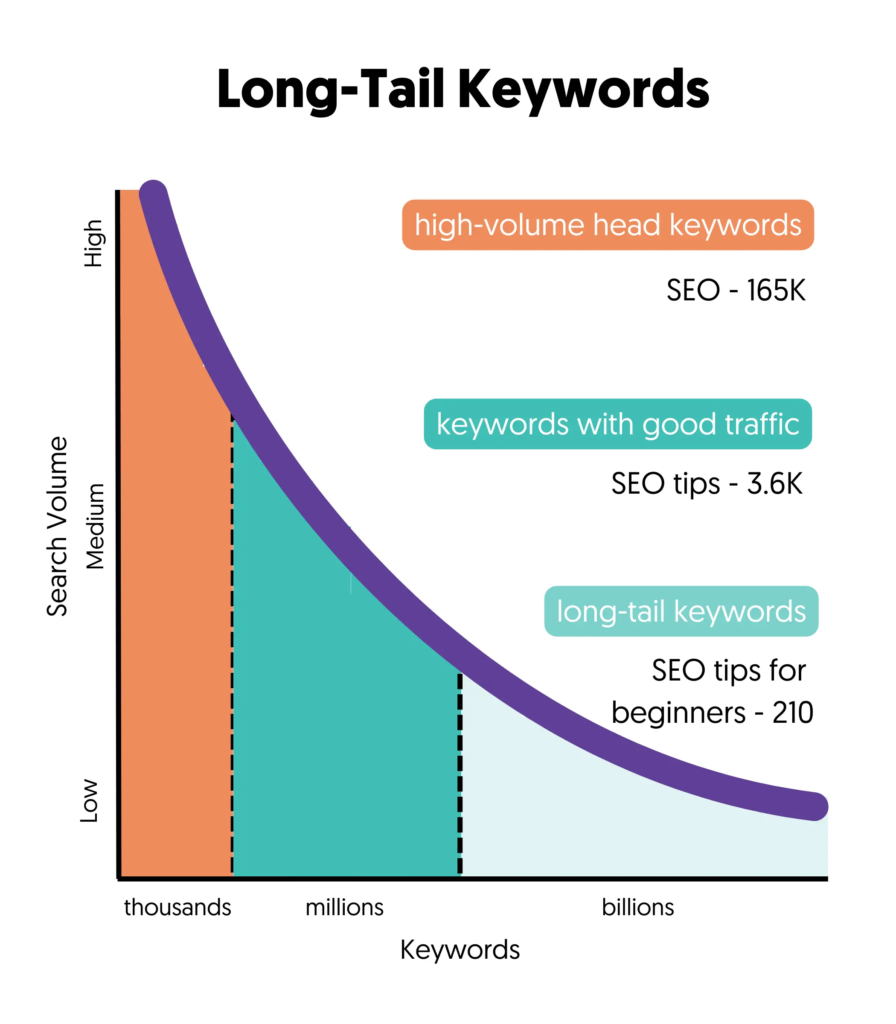
In the competitive world of digital marketing, niche businesses often struggle to stand out and attract their ideal customers. However, there’s a powerful tool that can level the playing field: long-tail keywords. These specific, often longer phrases can be the key to unlocking significant traffic and conversions for specialized businesses. In this blog post, we’ll explore the power of long-tail keywords for niche businesses and how they can transform your digital marketing strategy.
Understanding Long-Tail Keywords
Long-tail keywords are typically phrases of three or more words that are very specific to what you’re selling or the service you’re offering. Unlike broader, more competitive keywords, long-tail keywords are:
- More specific
- Less competitive
- Often have higher conversion rates
- Reflect more closely on what users are actually searching for
For niche businesses, long-tail keywords are particularly valuable because they allow you to target your exact audience with precision.
A study by Ahrefs found that 29.13% of keywords with 10,001+ monthly searches are made up of three or more words. This highlights the significant search volume potential for long-tail keywords.
How to Find and Fix Keyword Cannibalization Issues

Why Long-Tail Keywords Matter for Niche Businesses
- Lower Competition: Niche businesses often can’t compete with larger companies for broad, high-volume keywords. Long-tail keywords, being more specific, have less competition, making it easier for smaller businesses to rank well in search results.
- Higher Conversion Rates: Users searching with long-tail keywords often have a clearer idea of what they’re looking for, making them more likely to convert when they find it. This targeted traffic can be a goldmine for niche businesses.
- Cost-Effective SEO: With lower competition, it’s often less expensive and time-consuming to rank for long-tail keywords, making them an ideal strategy for businesses with limited marketing budgets.
- Better Voice Search Optimization: As voice search marketing becomes more prevalent, long-tail keywords align more closely with how people naturally speak and ask questions.
How to Find Long-Tail Keywords for Your Niche Business
- Use Keyword Research Tools: Tools like Google Keyword Planner, Ahrefs, or SEMrush to help you discover long-tail variations of your main keywords. Look for phrases with lower competition but still relevant search volume.
- Analyze Your Competitors: Use SEO tools to see what long-tail keywords your competitors are ranking for. This can unveil opportunities you might have missed.
- Leverage Google’s “People Also Ask” and “Related Searches”: These sections in Google search results can provide excellent ideas for long-tail keywords that real users are searching for.
- Mine Your Customer Service Inquiries:The questions your customers ask can be a goldmine for long-tail keyword ideas. They reflect the exact language your audience uses.
- Use Amazon’s Search Suggestion: If you’re in e-commerce, Amazon’s search bar can provide valuable long-tail keyword ideas based on real shopping behavior.
Implementing Long-Tail Keywords in Your Content Strategy
- Create Targeted Content: Develop blog posts, articles, or product descriptions that specifically address the long-tail keywords you’ve identified. For example, instead of just “organic dog food,” create content for “grain-free organic dog food for senior dogs.”
- Optimize Your Product Pages: Use long-tail keywords in your product titles, descriptions, and meta tags. For instance, a “handmade leather wallet with RFID protection” could be used instead of just a “leather wallet.”
- Develop an FAQ Section: Create an FAQ page addressing common questions in your niche, naturally incorporating long-tail keywords.
- Leverage Local SEO: For local niche businesses, combine long-tail keywords with location-specific terms. For example, “custom wedding cake bakery in downtown Portland.”
- Use Long-Tail Keywords in Your Link-Building Strategy: When reaching out for backlinks or guest posting opportunities, use your long-tail keywords to find highly relevant sites in your niche.
Measuring the Success of Your Long-Tail Keyword Strategy
To ensure your long-tail keyword strategy is effective:
- Track Rankings: Monitor your positions for targeted long-tail keywords.
- Analyze Traffic: Use Google Analytics to see which long-tail keywords are driving traffic to your site.
- Monitor Conversions: Set up goal tracking to see which long-tail keywords are leading to actual conversions.
- Adjust and Refine: Continuously refine your strategy based on the data you gather.

Case Study: Long-Tail Keywords in Action
Consider a small business specializing in eco-friendly baby products. Instead of trying to rank for highly competitive terms like “baby products” or “eco-friendly products,” they focused on long-tail keywords such as:
- “organic cotton baby swaddles for sensitive skin”
- “BPA-free silicone teething necklaces for moms”
- “biodegradable disposable diapers for newborns”
By creating detailed product pages and blog content around these specific terms, the business saw a 150% increase in organic traffic over six months and a 75% increase in conversion rates from organic search.
Common Mistakes to Avoid
- Keyword Stuffing: Don’t overuse your long-tail keywords. Keep your content natural and reader-friendly.
- Ignoring Search Intent: Ensure your content matches the intent behind the long-tail keyword.
- Neglecting On-Page SEO: Remember to optimize your titles, meta descriptions, and headers.
- Focusing Only on Volume: Sometimes, lower volume but highly specific long-tail keywords can be more valuable.

Conclusion
For niche businesses, long-tail keywords are not just a strategy; they’re a necessity. By focusing on these specific, less competitive phrases, you can attract highly targeted traffic, improve your conversion rates, and establish your authority in your specific niche. Remember, the key is to understand your audience deeply and create content that genuinely addresses their specific needs and questions.
As you implement your long-tail keyword strategy, keep testing, analyzing, and refining your approach. The digital landscape is always evolving, but by staying focused on your niche and the specific language your audience uses, you’ll be well-positioned to grow your online presence and your business.
Long-tail keywords for niche businesses are more than just a tactic; they’re a pathway to connecting with your ideal customers in a meaningful way. By mastering this approach, you’ll not only boost your traffic but also build a loyal customer base that values your specialized offerings.
About Clickseek
At Clickseek, we understand the power of long-tail keywords and their importance for niche businesses. As a comprehensive digital marketing agency, we specialize in crafting tailored SEO strategies that leverage the full potential of long-tail keywords to drive targeted traffic and boost conversions for our clients.
Our team of experienced digital marketers and SEO specialists can help you:
- Conduct in-depth keyword research to identify the most valuable long-tail keywords for your niche
- Develop a content strategy that effectively incorporates these keywords
- Optimize your website’s on-page and technical SEO to improve rankings for long-tail queries
- Create high-quality, informative content that addresses your audience’s specific needs
- Implement local SEO strategies to capture location-based long-tail searches
- Track and analyze the performance of your long-tail keyword strategy, making data-driven adjustments for optimal results
Whether you’re a small local business, an e-commerce startup, or a B2B service provider, Clickseek has the expertise to elevate your digital presence through strategic use of long-tail keywords. Let us help you unlock the full potential of your niche business in the digital landscape. Contact Clickseek today to learn how we can tailor a long-tail keyword strategy that drives real results for your business.


